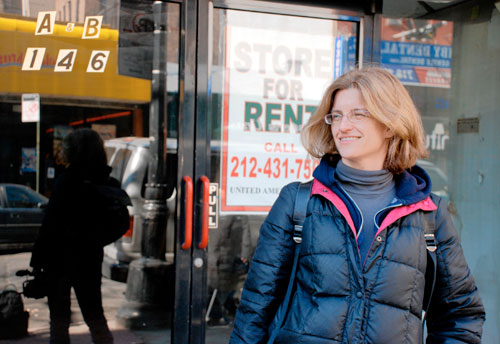Audiences had plenty to heckle when watching a new documentary about the borough’s rapid gentrification — and that’s not because they didn’t like the film.
The revelatory scenes of “My Brooklyn” make the case that politicians and other officials paved the way for the controversial transformation of the Fulton Mall from a shopping corridor catering to African-American customers to a hub for national retailers — displacing a community and steering millions to developers in the process.
The audience at a recent screening at Brooklyn Public Library bristled with exasperation as talking heads spoke, and a post-screening Q&A became a heated discussion over who is to blame, and what can be done.
“Even for someone like me who is pretty cynical about the political process, I was still surprised to see [the political system] so blatantly used for capital gain at the expense of the community,” said co-director Kelly Anderson, whose film is showing at Long Island University and UnionDocs in October.
The documentary’s heart beats around a major rezoning that sparked a wave of development in Downtown, which City Council quietly pushed through in 2002, heralding a new era of Starbucks and Aeropostale.
Gumshoe Anderson and co-director Allison Lirish Dean clearly did their homework as the film is informative and thorough. Interviews with shop owners and regular, working class folks feel candid, insightful, and wholly delightful. They make poetic use of photos from legendary shooter and Red Hook native Jamel Shabazz, showing Downtown as a center of community resilience and creativity during the 1980s and 1990s. The point they make is clear: good, hardworking people were displaced.
But at times, the film gets a little precious and heavy-handed about the glory of old Downtown. “My Brooklyn” feels sentimental toward an era when landlords torched their buildings and Myrtle Avenue was called “Murder Avenue.”
Anderson also seems to upend fairness by selectively quoting newcomers (or those welcoming big-box chains and high-end boutiques), portraying them as shallow, judgmental and naïve, although she is happy to point out that those moving into the new buildings cannot be blamed for others’ displacement — as Anderson moved into Park Slope in 1988 as an early gentrifier.
At its best, “My Brooklyn” connects the dots between city policy and neighborhood change, underscoring the importance of community engagement. But if nothing else, Anderson reminds viewers that blame can often be found by answering one simple question: “Who benefits?”
“My Brooklyn” screenings Wed. Oct. 3, 6 pm, Long Island University (Kumble Theater, Flatbush Avenue Extension, near Willoughby), and Sun. Oct.7., 7:30 pm, UnionDocs (322 Union Ave. near Maujer Street). Visit www.mybrooklynmovie.com.

























